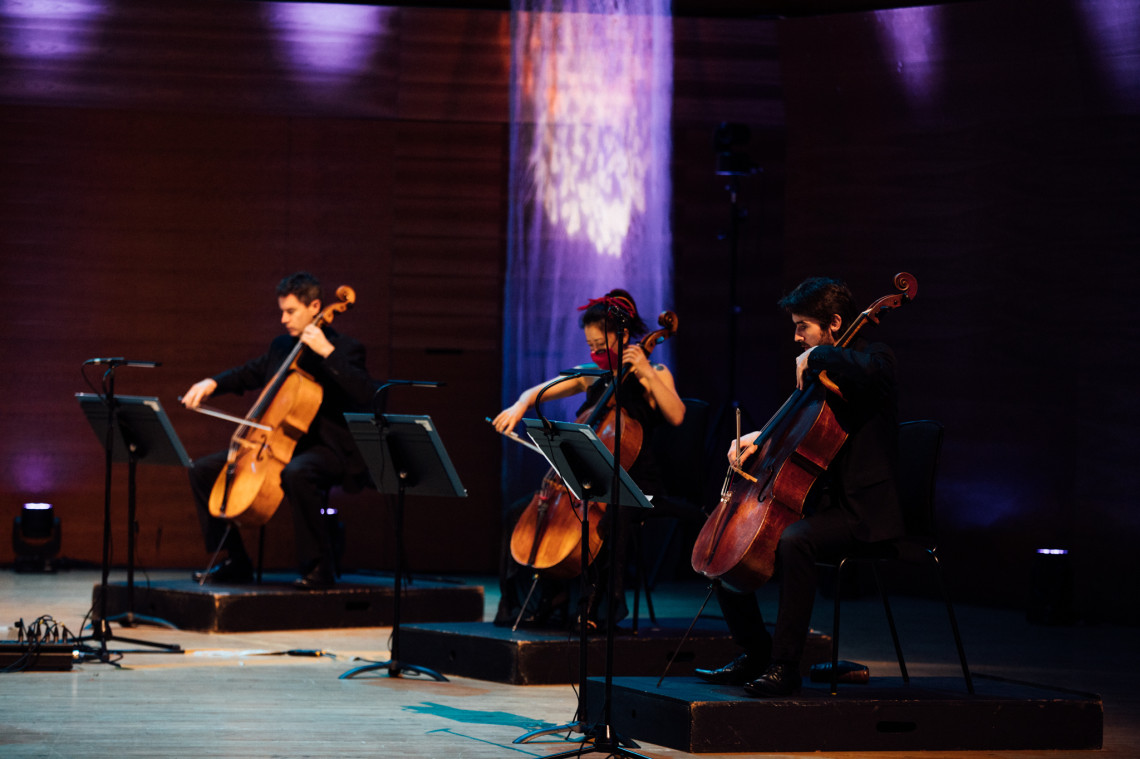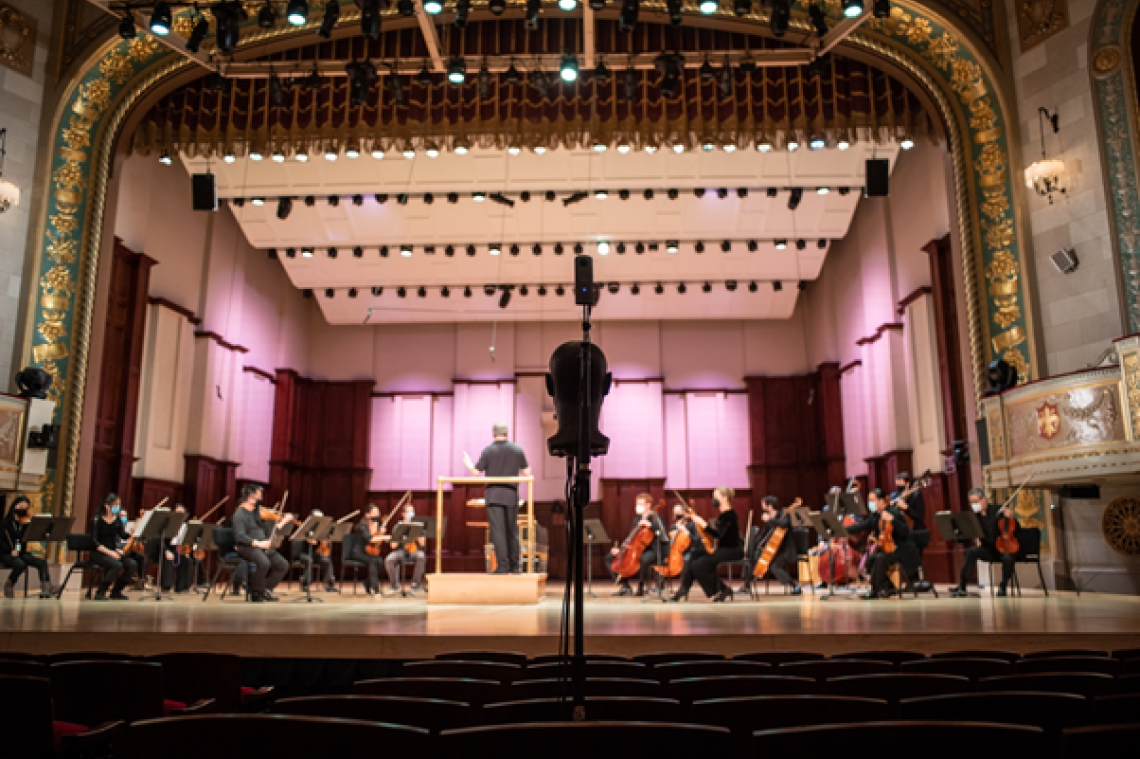
In conversation with Anna Clyne
11 Apr 2021
News Story
We caught up with our Associate Composer Anna Clyne ahead of the Orchestra's performance of her new work Overflow premiering this Thursday. Here, Anna shares the inspiration behind the new piece and how she's been innovatively creating music from her home in New York City.
Can you tell us a little about this work and where you drew your inspiration?
Overflow is inspired by Emily Dickinson’s poem, By The Sea, in which we experience the ocean’s power over the poet’s imagination - both alluring, unsettling and dangerous. The line from which this piece takes its title “Would overflow with Pearl” reminded me of an image from Jelaluddin Rumi’s poem Where Everything is Music whereby the tiniest motion of a pearl on the ocean floor can cause great waves above. The opening sonority of Overflow also draws inspiration from Rumi’s words of a “slow and powerful root that we can’t see” with a low B-flat, the lowest pitch of the ensemble emerging from silence.
Read Emily Dickinson's poem: By the Sea

SCO Cellos performing Anna Clyne's Within Her Arms last November.
Credit: Ryan BuchananLast year, we performed Within Her Arms which you wrote for string ensemble, whereas Overflow is written for winds. Can you tell us how you found the process of writing music for wind instruments?
I am a cellist and a beginner fiddler so I feel very comfortable writing for strings – having a connection to the physicality of playing these instruments and their idiosyncrasies. Woodwinds and brass, however, are more mysterious to me as, other than playing the recorder in junior school, I don’t have a direct connection to the experience of playing wind instruments. When I was invited to write a chamber ensemble piece for musicians of the SCO, I saw this as an opportunity to experiment more with writing for wind instruments – to get to know the idiosyncrasies of these instruments both as individuals and as a large uniform texture of sound. One of the wonderful things about being Associate Composer with the SCO is that I am able to collaborate with the musicians during the process of composing, so I saw this is a great opportunity for that reason also. I live in New York but was able to email passages to various musicians and to receive their feedback and input to the piece as I was writing it.
One of the wonderful things about being Associate Composer with the SCO is that I am able to collaborate with the musicians during the process of composing, so I saw this is a great opportunity for that reason also.
You joined the rehearsals in Perth Concert Hall over Zoom video call from your home in New York. How was it to experience speaking with the players from thousands of miles away, and to hear your piece performed for the first time without you physically in the room?
This has been an incredibly difficult and challenging year for many, but one positive thing that has emerged is a greater utilization of, and access to, technology. Whilst the audio quality of Zoom is somewhat limited, it was really wonderful to be present at the rehearsal virtually. I was able to see and hear the musicians in the room and was able to relay my comments, feedback and questions to the musicians. One limitation of Zoom is that when I was unmuted, I was unable to hear the musicians clearly, so we opted to having me relay comments via the chat function. I also met with oboist Nicholas Daniel, who also directed the ensemble, via zoom after the first rehearsal to go over some notes together. I really appreciated the collaborative spirit of the musicians in refining the piece and am delighted with their performance and recording.
We've recently spotted pictures of 'Ted the Head', can you tell our audience a bit more about him as well as any other ways that you have had to adapt your writing process with current restrictions?
Ted the Head is a revolutionary new application of audiovisual technology which is currently being developed by my husband and audio engineer Jody Elff. Ted is a mannequin head fitted with a custom-built binaural microphone array combined with some creative audio-transport technology, and a 360-degree spherical camera, allowing audio and visuals to be sent over the public internet to any other location. With this technology I am able to interact with the conductor and musicians in real time and, due to the very high fidelity audio quality, am able to comment on subtler musical elements that are more challenging with Zoom or Skype, like balance and phrasing, remotely. We have utilized Ted for rehearsals and premieres with the Orlando Philharmonic, River Oaks Chamber Orchestra, and the Dallas Symphony amongst others. You can read more about Ted here.

Ted the Head in rehearsals
Credit: Sarah SmarchMy writing process has remained similar to pre-pandemic. It has actually been a very productive period of time with few distractions such as travel. It has also led to new collaborations with artists internationally as we become more comfortable with remote technology. For example, I recently collaborated with London-based artist Jyll Bradley with the Scottish Ensemble and the Orchestra of St Luke’s. I have also been collaborating closely with musicians via Zoom as I’ve been writing more music for chamber ensembles and soloists that are more practical for socially distanced performances.

You are currently mentoring three women composers as part of New Stories, the SCO’s mentorship programme for emerging composers. Is there any advice you received or wished you had been told when first starting your career as a composer?
I am delighted to have worked with three very gifted composers as part of the New Stories programme. One of the most important pieces of advice that I received from my mentor Julia Wolfe, with whom I studied composition at Manhattan School of Music, is to follow my intuition – at the end of the day, even though we incorporate many tools such as harmony, counterpoint and form, composing music is very much an intuitive art form and one learns to trust this with time. For composers in the early stages of their careers – I would recommend working closely with musicians to learn the idiosyncrasies of each instrument – the building blocks which are essential before jumping into writing for the orchestra
Since the lockdown I have taken up the banjo and fiddle so have also been listening to a lot of old time music and fiddle music, which has been a lot of fun.
Can you tell us about some of the music that has been inspiring you recently?
I’ve been doing a lot of listening in connection with projects that I am working on. I am currently writing a soprano saxophone concerto, Glasslands, for Jess Gillam, so I have been listening to a lot of her recordings. I also recently composed a clarinet quintet, Strange Loops, so have been listening to various clarinet quintets. Since the lockdown I have taken up the banjo and fiddle so have also been listening to a lot of old time music and fiddle music, which has been a lot of fun. To relax I often listen to the jazz greats – Ella Fitzgerald, Louis Armstrong, Nina Simone and Frank Sinatra.
Explore more of the Anna's lockdown listening on this Spotify playlist created by the composer.

WATCH THE PREMIERE OF OVERFLOW
Anna Clyne's new work Overflow will be feature in our latest online concert - Caplet, Clyne & Dvořák - premiering on our YouTube channel and Facebook Page, this Thursday, 7:30pm.
Related Stories
![]()
A return to live music making
12 August 2021
Celebrating our much longed-for return to live music-making with of 27 performances across Scotland from September to December 2021![]()
Through the eyes of...Louisa Stanway
7 July 2021
SCO Concerts & Projects Manager, Louisa Stanway, takes us backstage for an insight into the planning of a Digital Concert Series.![]()
Four new online concerts for you to enjoy this spring
1 April 2021
Today we announce four more online concerts extending our Spring Digital Season to the end of May 2021.


